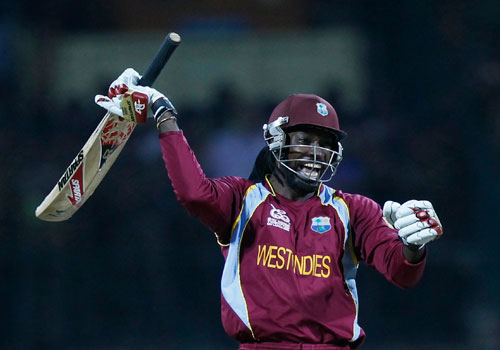
The West Indies kept their World Twenty20 semi-final hopes alive by knocking out New Zealand via the Super Over after their crucial Super Eights match ended in a tie at Pallekele International Stadium here Monday.
Defending a paltry total of 139 all out, the West Indies churned out a disciplined bowling performance with Sunil Narine (3/20) showing the way to restrict the New Zealand to 139 for seven in 20 overs despite a valiant unbeaten 62 by Kiwi captain Ross Taylor. Narine was also adjudged Man of the Match.
In the Super Over, Taylor and Brendan McCullum spanked Marlon Samuels for 17 runs. For New Zealand, the Super Over turned out to be disastrous.
Tim Southee was completely erratic bowling a no-ball and a wide. His first delivery was a no-ball and Chris Gayle hammered it for a six. West Indies needed five runs off the last and Samuels hit the penultimate ball for a six to finish off the match in style as New Zealand were second time unlucky in the Super Over.
West Indies' semi-final hopes now depend on the outcome of the match between hosts Sri Lanka and defending champions England. A Sri Lanka win will knock out England and pave the way for the West Indies in the semi-final.
On a slow track, West Indies batsmen struggled against the New Zealand spinners. While New Zealand pacers Southee (3/21) and Doug Bracewell (3/31) shared six wickets, it were the spinners Nathan McCullum (2/19) and Ronnie Hira (1/24), who dried down the flow of runs.
Gayle top scored for the West Indies with a quickfire 30 off 14 deliveries, hitting three fours and two sixes, while Samuels (24) and Kieron Pollard (28) also came up with valuable knocks.
West Indies bowlers then put on a disciplined display to trouble the New Zealanders. Martin Guptill (21) and Brendan (22) got starts but failed to convert them to big scores. Taylor's unbeaten knock kept New Zealand on course.
With New Zealand needing 17 runs from the last two balls, Narine bowled an excellent penultimate over giving away just three runs to make it a tough task for Taylor and Bracewell.
West Indies skipper Darren Sammy entrusted Samuels, who hadn't bowled till then, to bowl the last over.
Taylor hit Samuels for a six in the fourth ball to bring the equation down to three from two. Taylor took a single off the fifth delivery leaving Bracewell to score two off the last bowl. But a brilliant direct throw by substitute Dawyne Smith ran out Bracewell with the scored tied.





Comments
Add new comment